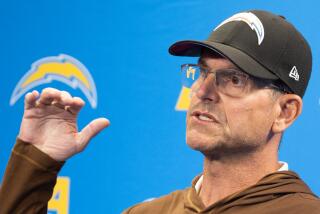Crying Shame
- Share via
EVANSTON, Ill. — Northwestern Coach Randy Walker on Wednesday fought back tears as he apologized for the death of football player Rashidi Wheeler, saying: “I am beyond sorry.”
Struggling to maintain his composure during an exclusive interview with The Times in his office behind Ryan Field, Walker paused repeatedly to collect himself as he talked about the player who died last Friday after a rigorous preseason drill. “Sorrow and grief doesn’t begin to express it.” Regret? “No question.”
Although he wasn’t on the field when Wheeler collapsed, Walker said he understands fully he is accountable. “I know ultimately it all ends up on my desk,” he added.
Later Wednesday, Northwestern announced it would “immediately” launch a “thorough review” into the circumstances of Wheeler’s death, a review that Walker, in his third year at Northwestern, said he welcomes.
But Walker defended his insistence that his players be in superb physical condition, able to withstand the grueling drills that he is known for putting his players through.
“I have no doubt a better-conditioned athlete is a whole lot more likely to survive the game of football,” Walker said with unintended irony. “I didn’t write the rules. But it is a rigorous sport.”
At least four players collapsed during last Friday’s strenuous drill--28 sprints ranging from 100 to 40 yards--that was a prerequisite for players. The temperature that day on the field along Lake Michigan, on the northern reaches of Northwestern’s campus, was in the 80s.
Wheeler, 22, of Ontario, a senior starter at safety, was among those who collapsed with several sprints remaining. In what teammates have described as a chaotic scene, with staff rushing from one player to another, Wheeler, a chronic asthmatic, appeared to revive. But then he stopped breathing.
According to reports, paramedics arrived from 30 to 40 minutes after Wheeler collapsed. He was pronounced dead at Evanston Hospital about an hour later. The Cook County medical examiner’s preliminary report listed bronchial asthma as the cause of death.
Before a memorial service Tuesday at a university chapel, Wheeler’s mother, Linda Will, said, “My son did not have to die.”
The Rev. Jesse Jackson appeared Tuesday at the service on behalf of Will and her ex-husband, George Wheeler, and said afterward, “The family is grieving but curious. The concern is what happened in the last hour of their son’s life. Was there the infrastructure in place to handle this?”
Walker confirmed Wednesday that the on-field staff phone apparently was not working. Jackson said rescue crews were called via cellular phone.
Because the drill was held before Northwestern officially begins training camp, NCAA rules prohibited coaches from attending. Walker said six trainers as well as two strength coaches were on the field.
Compared to other Division I schools, Walker said, that level of staffing “would be in the 90th percentile of summer workout coverage.”
Asked if there was something the university or he could have or should have done, Walker said, “We’re going to review, certainly, everything that we do.” He stopped, then said, “I don’t know reasonably what more could have been expected.”
And he said, “I feel we had the right level of coverage for the event going on.”
The school’s investigation is sure to focus on the conditioning drill that Walker demands his players pass--no ifs, ands or buts. “I’ll be the first to say: in the 21st century, I’m probably a little bit of a throwback,” Walker said.
Walker arrived at Northwestern in 1999, after nine seasons as head coach at Miami of Ohio, taking over from Gary Barnett. In 1999, Northwestern struggled to a 3-8 record. Many players on the team were simply not in good shape, Walker said.
Last year, after a full year of Walker’s rigorous conditioning regime, the Wildcats were one of three teams that tied for the Big Ten championship--after a season that included a number of stunning last-minute wins, including a memorable 54-51 victory over Michigan. Walker was named Big Ten coach of the year.
This year’s team opens the season Sept. 7 at Nevada Las Vegas--meaning it will play in the desert heat, albeit in the evening.
Dozens of players ran the drill last Friday because those who passed then would not have to run it Aug. 17 in Kenosha, Wis., when Northwestern opens camp.
“Let me say this: Do you suspect Northwestern has a lock on hard work, on conditioning emphasis? I ask that question of our players,” Walker said.
“Do you think we’re the only ones that after they present you a full scholarship worth $35,000 per year would not reasonably expect you to be in the best shape you could be in?”
He said the running drill is telling because it’s like football--a quick burst followed by a brief recovery, followed by more exertion followed by another recovery, and so on.
He said repeatedly that he believes the drill is not unreasonable.
“To paint what we are here, what I am, as outrageous, is very unfair,” he said.
At another point, he said, “It’s 12 minutes, ballpark, and you run [a total of] 11/4 miles.”
And again: “It’s a workout they prepare to run all summer. This is not the first time. This was not, hey, guess what we’ve got for you today.”
And: “Our 48-year-old strength coach, Larry Lilja, ran this test a week ago.” He also said: “Larry also manages it. He wouldn’t let someone run this test that isn’t prepared to run.”
Lilja, team trainer Tory Aggeler and others were not available for comment Wednesday. The university’s investigation means they--as well as Walker--likely will not be available for comment on Wheeler’s death from now on, according to Mike Wolf, Northwestern’s assistant athletic director for media services. A statement announcing the review said that “during the pendency of the review, the university will not discuss any preliminary findings or conclusions.”
In making his remarks about Lilja, Walker emphasized he is not trying to shift accountability or responsibility.
“It’s on my desk. But it wasn’t under my control. It wasn’t me pulling the strings. That’s what is so difficult.”
He said he had been doing yard work when he was called to the lakefront.
Aggeler had helped Wheeler off the field, then went to attend to another player, Walker said, explaining he was told the details later. But Wheeler was not left alone, Walker said; he was with one of the other trainers.
“Somewhere between 15 to 20 minutes from the time he [had stopped] running, is when it went south fast,” Walker said.
As Walker arrived at the lakefront, Wheeler was being loaded into an ambulance. Along with several players, Walker followed to the hospital.
Within a half-hour, he said, a doctor broke the news--Wheeler was dead.
“I’m in a room with 10 players,” he said. “There were some [other players] in a corridor. Some were outside. I go out there, these kids are really in agony. I’m holding Raheem Covington,” a senior cornerback from Pine Hills, N.J.
Kevin Bentley, a senior linebacker from North Hills, had Wheeler’s cellular phone, Walker said. Wheeler’s father was called, he said. Then, by happenstance, Wheeler’s mother, called--and was told her son was dead.
“I’ll never forget that room, that feeling,” Walker said, biting his lip. Walker said he was--and is--”devastated.” He said, “I’m sorry about the death of Rashidi Wheeler,” sorry “beyond belief.”
Walker also said, “What do we do about this? We’re not going to stop kids from working out in the summer.
“There’s something mysterious about [the events] to me,” he continued. Referring to the drill, he said, “That should not have had this result. I am just astounded. That’s where I’m struggling with this.
“How are we going to run this now?
He paused, then tried again: “How do we fix it? I don’t know.”
More to Read
Go beyond the scoreboard
Get the latest on L.A.'s teams in the daily Sports Report newsletter.
You may occasionally receive promotional content from the Los Angeles Times.










